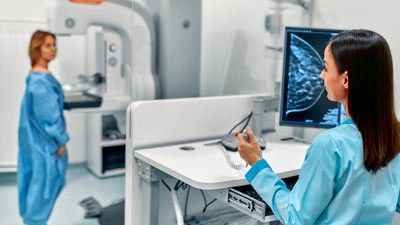One of the most significant advantages of mammograms is their ability to catch breast cancer at an early stage when treatment is most effective.
Sometimes, your mammogram results may need follow-up screenings, particularly if your results show dense breast tissues. If you're wondering what it means and why you need additional tests, here's a detailed understanding of the same by
Dr Sandeep Nayak, Director, Department of Surgical Oncology, Fortis Hospital, Bannerghatta Road, Bengaluru.
Why And When Should You Get A Mammogram?
You can get a mammogram if and when you suspect breast cancer or as a part of a routine breast health examination. Experts usually recommend annual mammograms for women over 40, regardless of symptoms or family history.
Some women, or very rarely, men, can also get if you are at a higher risk of breast cancer. Risk factors include age, genetics, reproductive history, family history, and dense breasts.
What Does Dense Breast Tissue Mean In A Mammogram Result?
According to Dr Nayak, having dense breasts simply means you have more glandular and fibrous tissue than fatty tissue. This is actually quite common, affecting about half of women over 40 who undergo mammograms.
While there isn't an exact reason, research suggests factors like genetics, menopausal hormone therapy, and low body mass index contribute to dense breasts. On the flip side, having children and increasing age tend to lower breast density.
The Link Between Dense Breasts And Breast Cancer Risk
As per the National Cancer Institute (NCI), dense breasts are not considered an or a disease. However, they are a risk factor for breast cancer.
"This risk is separate from the effect of dense breasts on the ability to read a mammogram," the health body notes.
"Think of it this way: dense breasts can hide tumours, making them harder to spot, and they also increase your likelihood of developing breast cancer," Dr Nayak explains.
Next Steps
If your mammogram reveals dense breasts, don't panic, assures Dr Nayak. Instead, discuss your individual situation with your healthcare provider, considering factors like family history and other risk factors. They might recommend additional screening tests, such as:
- 3D Mammography: Helps detect cancers that might be hidden on traditional mammograms, especially useful for dense breasts.
- Ultrasound: Can find cancers not visible on mammograms but may lead to unnecessary biopsies.
- MRI: Useful for high-risk groups, but may not be covered by insurance.
It is important to note that dense breasts do not mean you keep getting mammograms. According to the doctor, the guidelines recommend yearly mammograms for average-risk women. However, if you're in a high-risk group or have a strong family history, your doctor might suggest more frequent screenings or additional tests.
